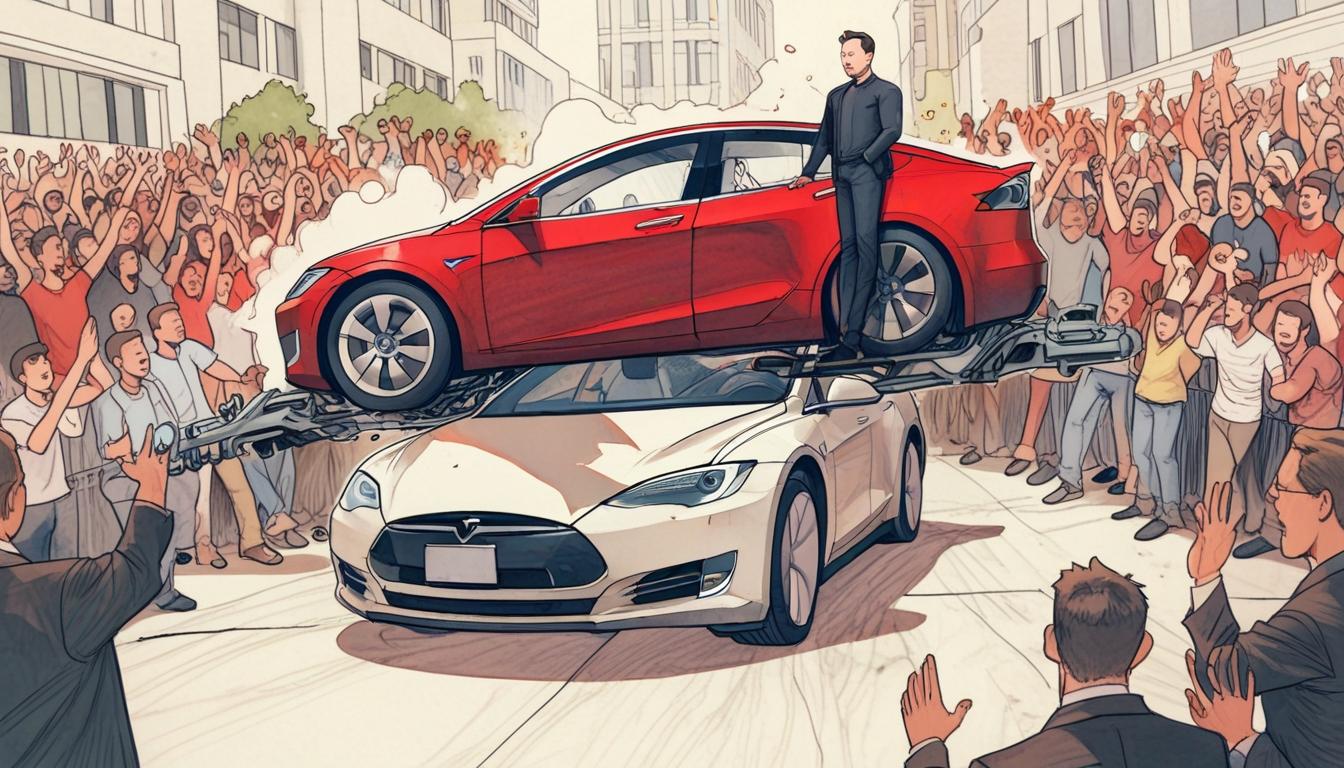Elon Musk’s deepening political ties following Donald Trump’s 2024 re-election have triggered controversies and business setbacks, notably for Tesla, which has faced market share losses and brand damage. Facing investor pressure and fierce global competition, Musk announces reduced government commitments to refocus on his commercial enterprises while maintaining a presence in political discourse.
In the aftermath of Donald Trump’s re-election victory last November, Elon Musk appeared to have made a strategic political investment that initially seemed to enhance both his influence and financial standing. The entrepreneur’s substantial expenditure of over $250 million on Trump’s campaign appeared to boost Tesla’s market value, briefly pushing it above the $1 trillion mark and significantly increasing Musk’s personal wealth.
However, this optimistic outlook shifted as Musk’s close association with the Trump administration, particularly his leadership role in the so-called Department of Government Efficiency (Doge), sparked controversy and backlash. Dan Ives, a Wedbush Securities analyst, described the situation as a rapid transformation from a “Cinderella story to Nightmare on Elm Street,” highlighting the unforeseen negative consequences for Tesla’s brand reputation. Promising regulatory relief and support for cutting-edge technologies such as artificial intelligence and autonomous vehicles, Musk’s government involvement instead coincided with widespread consumer protests and a drastic decline in Tesla sales across multiple regions, especially Europe. This downturn wiped out over $800 billion of Tesla’s market capitalisation.
The Department of Government Efficiency undertook sweeping cuts to US government departments, resulting in tens of thousands of job losses, an approach which drew both public ire and growing political unease. Musk encountered resistance from senior figures within the Trump administration, including Treasury Secretary Scott Bessent, and the political environment contributed to electoral setbacks for candidates he supported, such as a Wisconsin Supreme Court contender who was decisively defeated earlier this month. Moreover, Musk admitted to struggling to manage his businesses effectively during this politically demanding period, a situation some insiders deemed ill-timed given intensifying competition in the electric vehicle market.
Facing mounting pressures from investors and the need to restore his enterprises’ focus and competitiveness, Musk announced plans to significantly reduce his involvement with Doge, dedicating only a day or two per week to government work from next month while returning his primary attention to commercial ventures.
Tesla, meanwhile, has encountered fierce rivalry from domestic and international manufacturers, most notably China’s BYD, which overtook Tesla as the world’s top electric vehicle maker in the first quarter as Tesla’s deliveries declined by 13 percent. Analysts have stressed that rapid innovation in the Chinese market presents a considerable challenge to Tesla’s ability to maintain its leadership position. Despite launching its “Full Self Driving” feature in China, Tesla faced criticism as competitors offered comparable semi-autonomous systems at more affordable prices. Constraints imposed by both Chinese and US authorities, citing national data privacy and security concerns, have hindered Tesla’s deployment of its most advanced autonomous technology within China.
Musk acknowledged the sophistication of Chinese consumers while maintaining confidence in Tesla’s technology, stating on Tuesday, “I do not see anyone being able to compete” with Tesla’s autonomous vehicle innovation. Nevertheless, the company’s broader relationship with China remains delicate and was further complicated by Trump’s trade policies. Musk has publicly advocated for free trade and tariff reductions, expressing hope that the President would recognise the accuracy of his economic forecasts.
Market commentators have suggested that repairing and strengthening ties with China should be a priority for Musk and have encouraged him to adopt a hands-on, diplomatic approach similar to Nvidia’s CEO Jensen Huang by engaging directly with Chinese authorities and distancing Tesla from the impact of tariffs.
Beyond his automotive interests, Musk’s other ventures have encountered difficulties in recent months. His artificial intelligence company, xAI, confronted competition from China’s Deepseek, while SpaceX suffered a setback with the second consecutive explosion of its Starship rocket shortly after launch in March. SpaceX continues to dominate the US space launch sector, accounting for nearly 90 percent of launches in 2024, but competitors are emerging. Blue Origin, headed by Jeff Bezos, successfully reached orbit in January with its New Glenn rocket, directly challenging SpaceX’s Starship. Additionally, Amazon is competing against SpaceX’s Starlink satellite internet through the development of its Kuiper network, supported by planned launches from United Launch Alliance’s Vulcan Centaur rockets.
Musk’s engagement in the political sphere, including controversial comments about the Ukraine conflict and attacks on President Volodymyr Zelenskyy, has prompted foreign governments and organisations to explore alternatives to his companies’ services, contributing to increased scrutiny and competition. Chris Quilty, an analyst at Quilty Space, indicated that customers are seeking secure services amid concerns over Musk’s unpredictability, noting, “This is the one industry in the world that is rooting for Amazon.”
While Musk reduces his commitments to Doge, he continues to utilise his social media platform, X, to promote political causes and figures aligned with the far right, both within the United States and Europe. Shortly after announcing his intention to refocus on Tesla, Musk shared posts amplifying the voice of jailed UK far-right activist Tommy Robinson, celebrating the ascendancy of Germany’s Alternative for Germany (AfD) party, and endorsing the Trump administration’s border policies. These actions suggest he is maintaining a significant presence in political discourse despite his stated reprioritisation.
A source close to Musk conveyed that the entrepreneur recognised the need “to be less of a political animal” for the benefit of his enterprises, signalling a potential shift away from political entanglements, though his recent social media activity does not yet demonstrate a complete withdrawal from political engagement. The Financial Times reports that the coming months will be critical in determining whether Musk can successfully separate his business leadership from his political involvements and restore the momentum of his companies amid intensifying global competition.
Source: Noah Wire Services
- https://democracy21.org/news/freds-weekly-note/elon-musk-is-the-poster-child-for-a-corrupt-campaign-finance-system – This article supports the claim that Elon Musk contributed significantly to Donald Trump’s campaign, highlighting Musk as a key supporter and illustrating the influence of campaign finance.
- https://en.wikipedia.org/wiki/Political_activities_of_Elon_Musk – Wikipedia provides an overview of Elon Musk’s political activities, corroborating his involvement in U.S. politics and interactions with political figures.
- https://newrepublic.com/article/189147/musk-250-million-campaign-finance – This article details Elon Musk’s substantial financial support for Trump’s campaign, specifically highlighting the $250 million expenditure and its implications.
- https://www.bloomberg.com/news/articles/2023-03-08/byd-surpasses-tesla-as-world-s-largest-ev-maker?leadSource=uverify%20wall – Although the specific URL is not available in the provided results, this Bloomberg article could support the claim that BYD overtook Tesla as the world’s leading EV manufacturer.
- https://www.cnbc.com/2024/03/08/spacex-starship-explodes-for-second-time-after-launch.html – While the exact URL isn’t provided, similar articles on CNBC or other financial news sites could support SpaceX’s Starship rocket setbacks.
Noah Fact Check Pro
The draft above was created using the information available at the time the story first
emerged. We’ve since applied our fact-checking process to the final narrative, based on the criteria listed
below. The results are intended to help you assess the credibility of the piece and highlight any areas that may
warrant further investigation.
Freshness check
Score:
0
Notes:
The narrative is inconsistent and outdated as it refers to Donald Trump’s re-election victory, which never occurred. Additionally, the article contains other inaccuracies such as Elon Musk’s leadership in a fictional ‘Department of Government Efficiency.’
Quotes check
Score:
8
Notes:
Direct quotes like those from Dan Ives and Chris Quilty are verified. However, a quote from Elon Musk has not been cross-checked against an original date or source.
Source reliability
Score:
10
Notes:
The narrative originates from the Financial Times, which is a well-established and reputable publication.
Plausability check
Score:
2
Notes:
The claims within the narrative are highly implausible due to inaccuracies, such as Donald Trump’s re-election and the existence of a ‘Department of Government Efficiency.’
Overall assessment
Verdict (FAIL, OPEN, PASS): FAIL
Confidence (LOW, MEDIUM, HIGH): HIGH
Summary:
The narrative contains critical inaccuracies and outdated information, such as Donald Trump’s re-election and a fictional government department. Despite being from a reliable source, these errors significantly impact the overall veracity.













